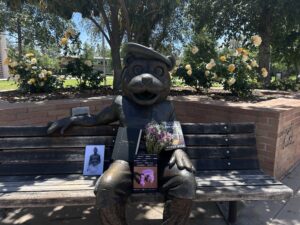Monday, May 5 marked the commencement of the University of California, Riverside (UCR) 48th annual Writers Week. The returning longest-running, free literary festival was held in Interdisciplinary South (INTS 1113), with no alternatives to join over zoom. Through the strife of disruption caused by the pandemic in 2024, The Creative Writing Deprtment’s remarkable efforts took the event global by making it virtually accessible. This year, however, attendees were reminded of the precedent set by the 1st Annual Writers Week in 1977, which was meant to be enjoyed in-person, facilitating engagement between literature enthusiasts and a plethora of writers.
In close quarters, brought together by a shared appreciation of literature, the 48th Annual Writers Week returned with a diversity of author panels, featuring promising and distinguished writers: Xochitl-Julisa Bermejo, Jos Charles, Geoffrey Dyer, Jennifer Espinoza, Blas Falconer, Edgar Gomez, Jean Guerrero, Bret Anthony Johnston, Erin Marie Lynch, Sarah Manguso, Maggie Nelson, Lilliam Rivera and Steven Shaviro.

Monday, May 5th
Jean Guerrero’s “Crux: A Cross-Border Memoir” and “Hatemonger: Stephen Miller, Donald Trump and the White Nationalist Agenda” headlined the first panel, scheduled at 11 a.m. Guerrero is widely recognized for her extensive experience as an investigative journalist, reporting on various topics for The New York Times, Los Angeles Times, Vanity Fair, Politico, The Nation, Wired, The Washington Post, KPBS and more.
As an award-winning reporter, her career has explored family separations at the border, Trump’s wall, deportations and migration— topics of interest that she reflects on more intimately for her debut book,“Crux: A Cross-Border Memoir.” In Crux, Guerrero uses fiction to trace an inevitable self-exploration that transcends the physical crossing of the U.S.-Mexico border to address the relationship between herself and her father, and the embodiment of trauma that manifests through his mental illness. “Hatemonger: Stephen Miller, Donald Trump and the White Nationalist Agenda” takes on a more journalistic approach in examining prevailing nationalism and racism in the 21st century
Xochitl-Julisa Bermejo’s “Incantation: Love Poems for Battle Sites” and “Posada: Offerings of Witness and Refuge” were featured works for the 1 p.m. panel. As the daughter of Mexican immigrants raised in San Gabriel, California, Bermejo lets her Chicana experience guide her writing, many of which can be found in The Offing, American Poetry Review, Acentos Review, [PANK] Magazine, VIBE, Huizache, About Place Journal, Calyx, Santa Fe Writers Project and other publications.
Her debut collection, “Posada: Offerings of Witness and Refuge,” takes readers through real and imaginative borders to reconstruct her family history. Bermejo articulates visceral memories and bears witness to stories of feminist solidarity, refuge and social justice. Bermejo’s latest collection, “Incantation: Love Poems for Battle Sites,” explores United States monument sites with traumatic histories, offering poems of love, family, and friends as stories of resistance and resilience.
Llilima Rivera’s “Tiny threads” concluded the third panel of the day, scheduled at 3 p.m. Llilima Rivera is an award-winning author with many of her books featured in NPR, New Yorker, Los Angeles Times, the New York Times and other notable publications. Her most recent book, “Tiny Threads,” will be released on June 24, 2025, except for copies provided at the book signing following the Q&A and reading panel. “Tiny Threads” follows a young female protagonist landing the job of her dreams, only to discover a dark supernatural twist to the glamorous world of fashion.
Tuesday, May 6th
UCR alumni Jennifer Espinoza’s “I Don’t Want to Be Understood,” “I’m Alive It Hurts,“ “I Love It” and “THERE SHOULD BE FLOWERS” were all spotlighted works in the 11 a.m. question and answer panel and reading. Jennifer Espinoza holds an MFA in Poetry from UCR and is currently a professor of creative writing. Espinoza’s latest book, “I Don’t Want to Be Understood,” draws from her life experience, tracing back from childhood to adulthood.
This collection of poems works as a personal archive of transsexual experience. Each poem is unapologetically human, challenging conventional narratives by questioning the limitations placed on what it means to be human. Espinoza’s poem “ADDENDUM” delivers a compelling timeline of her journey of self-acceptance and survival, with a striking final line “this is how i became a poet: i made myself fight exceptionally hard to love me.”
Geoffrey Dyer’s “The Last Days of Roger Federer, and Other Endings” was the main book of focus, along with a brief mentions of his other works “Jeff in Venice,” Death in Varanasi,” “But Beautiful,” “Out of Sheer Rage” and “Homework (forthcoming)” for the second session at 1 p.m.
In “The Last Days of Roger Federer, and Other Endings,” Dyer examines the concept of endings in the last days and last works of artists’ and athletes’ careers, and inevitably reflects on his own life as a writer by reconstructing memories. Dyer’s themes allow him to roam unrestricted. From the first page, he engages readers with an unconventional narrative style, omitting an introduction and clear chapter titles to reel readers into a journey of beginnings, endings and perhaps … endlessness.
Steven Shaviro’s “Fluid Futures: Science Fiction and Potentiality” followed after, as the third session of the day at 3 p.m. Steven Shaviro is best known for his scholarship in the emerging field of Science Fiction. He was most recently awarded the Science Fiction Research Association (SFRA) Award for Lifetime Contributions to Science Fiction in 2023. “Fluid Futures: Science Fiction and Potentiality” addresses futurity by observing the tools of extrapolation, speculation and fabulation within the context of unfolding future possibilities that our present conditions implicitly suggest. “Fluid Futures: Science Fiction and Potentiality” is brilliantly thought-provoking, inviting readers to contemplate his examples of philosophy, film analysis and close readings to consider the existing concepts in science fiction texts.








